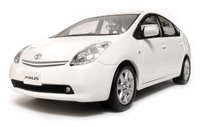Paradoxes and the oil crisis
 Charles Miller questions whether this blog is a parody (for the record: it's serious) and writes: "These problems are labeled the "Five Paradoxes of the Web." They're not paradoxes, of course, most of them don't even manage to be contradictions, but a good name is important." I insist that the term "paradox" is appropriate in this context.
Charles Miller questions whether this blog is a parody (for the record: it's serious) and writes: "These problems are labeled the "Five Paradoxes of the Web." They're not paradoxes, of course, most of them don't even manage to be contradictions, but a good name is important." I insist that the term "paradox" is appropriate in this context.
Consider a passenger car that goes 0-60mph in 20 seconds and burns 10mpg. You would expect a 10mpg car to accelerate on par with a Ferrari, or a slow car to use much less fuel. In a sense of "2. One exhibiting inexplicable or contradictory aspects", if such a gas-guzzler VW bug was ubiquitous it would be a paradox. Not a contradiction, but certainly quite inexplicable.
The Web, too, often offers the worst of both worlds, for example when it comes to identity and privacy management. A JavaScript tracker can effortlessly discover intimate details about the visitors' computers such as screen resolution, yet many sites don't recognize users after the browser is restarted. This is equivalent to someone knowing the brand and model of your TV but forgetting your name.
If the inefficient and underpowered car is the only one available, it's still a relatively good transportation option: for long distances, it is much better than traveling on foot. Even if this car is a worldwide standard, someone can still design, build and successfully market a Prius—providing a better choice in almost every respect and, in effect, solving the paradox.
 Subscribe.
Subscribe.
4 Comments:
A gas-guzzling VW bug wouldn't be a paradox, it would just be a badly-designed car.
Before the web came along, a lot of people were trying to design utopian hypertext systems. None of them were successful, but the web was. To find a successor for the web, you have to first explain (and thus be taking into account) how the compromises that went into making the web, many of which are your non-paradoxical paradoxes, were part of the reason for its success.
Another question: are you wishing to replace the web -- that hypertext system transmitted mostly over HTTP and displayed in web browsers -- as you mostly suggest, or are you looking to replace the entire Internet, as your citing of DOS attacks and DNS organisational problems suggests?
A gas-guzzling VW bug wouldn't be a paradox, it would just be a badly-designed car.
The car itself is not the paradox, but its ubiquity would be.
To find a successor for the web, you have to first explain ... how the compromises that went into making the web ... were part of the reason for its success.
This requires a longer response—a separate post is appropriate. The main point to consider is that the state of computing technology is changing very fast: in Internet years, the Web is ancient. Compromises that might have been appropriate in 1989 are outdated today. For example, simple and insecure authentication mechanisms in the basic protocol lowered the barrier for implementors, but created vulnerabilities: a trade-off that we wouldn't make today when the platform is used for financial transactions and security is a major concern.
Another question: are you wishing to replace the web ... or are you looking to replace the entire Internet...?
I wish to replace neither the Web nor the Internet: I want to create a new medium and open a new market. The system will not be primarily based on the hypertext: it will most likely look like a shared world instead of a Memex. Just like the Web is built on TCP, the next platform will be built on top of both Internet and Web protocols, but a fresh start gives an opportunity to enhance the current infrastructure—for example, design a better naming system that augments DNS.
what about a vw bug with a diesel engine that ran on bio-diesel?
I have no idea what a car has to do with this definition of "paradox". It confuses the heck out of me and if it's meant to make it clearer what you mean, well, it didn't.
Here's another "compromise" -- the security and other issues you raise are due to the interactions of various open source software (including server software and protocols) that mixed together became the internet. And yet it was BECAUSE they were open source that the internet succeeded and survived and that other, closed-source, vendor-specific and costly internetworking systems failed.
Post a Comment
<< Home